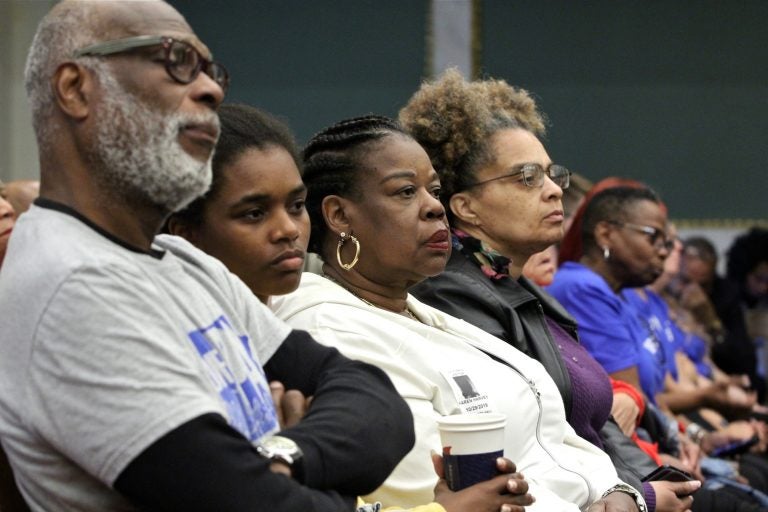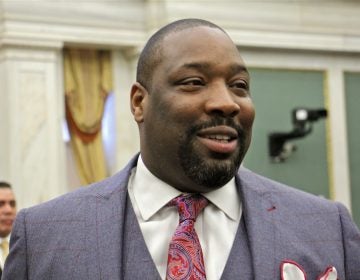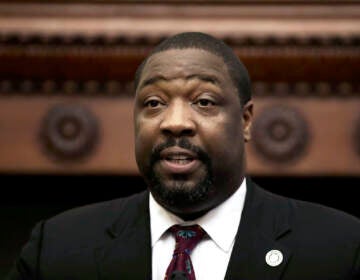Philly Council votes unanimously to provide free lawyers for tenants facing eviction
Philadelphia City Council unanimously passed a bill Thursday that will provide lawyers to low-income tenants facing eviction.

Audience members at Philadelphia City Council listen to testimony on a bill that would guarantee legal counsel to those facing eviction. (Emma Lee/WHYY)
Philadelphia City Council unanimously passed a bill Thursday that will provide lawyers to low-income tenants facing eviction in the city.
The legislation, introduced by Councilmember Helen Gym, is part of a wave of pro-renter legislation approved by the city in recent years.
“One’s ability to access the justice system and defend their shelter and home should not be based on who can afford a lawyer,” said Rasheedah Phillips, a long-time tenant advocate in the city. “The scales of justice should never be tipped in favor of a landlords’ ability to make a profit.”
The legislation now goes to Mayor Jim Kenney, who is expected to sign the bill into law. Once the mayor signs the bill, the program is expected to grow gradually over several years as funding is secured.
Ordinarily, counsel is only guaranteed to low-income people in criminal matters, not civil cases like eviction. Gym’s bill guarantees legal representation to tenants whose annual gross income does not exceed $24,980 for a single person and $51,500 for a family of four. Any tenants falling into that income category, including people living in Philadelphia Housing Authority properties, are eligible for representation, which will come from nonprofit legal providers.
Gym and others argue that Philadelphia and other U.S. cities are caught in a full-blown eviction epidemic that contributes to joblessness, health problems and poor educational outcomes as evicted families contend with the disruption of moving from place to place.
A 2018 study by published by Princeton sociologist Matthew Desmond, and a team of fellow researchers ranked the City of Brotherly Love fourth among big cities for the raw number of court filings seeking to oust residents from their homes and 81st out of 100 for the number of eviction judgments ordered by the courts.
Households headed by black women are most likely to face eviction, according to Desmond’s research.
“Black men are locked up, black women are locked out,” the sociologist wrote in his Pulitzer Prize-winning book, “Evicted: Poverty and Profit in the American City.”
As recently as a few years ago, 22,000 evictions were filed each year in Philadelphia, although the number has dipped slightly over the past few years. The overwhelming majority of landlords show up to eviction court with a lawyer, whereas most renters do not.
Many cases do not even make it before a judge. Most renters often reach a deal with their landlord’s lawyers — a “judgment by agreement” — which often results in unfavorable terms. The hope of right-to-counsel supporters is that legal aid will stop some evictions, but that in other cases tenants can at least leave under better terms: Get their security deposit back or keep the black mark of eviction off credit records, for instance.
A recent study from the Philadelphia Bar Association estimated that a right-to-counsel program could cost $3.5 million annually. But Gym has said that it is likely to be more expensive, especially after the scope of the bill was expanded last month to include administrative proceedings before the Philadelphia Housing Authority and the Fair Housing Commission.
“We have allocated $2.1 million in the most recent budget and we expect that to grow incrementally,” Gym said. “Then we will continue to evaluate whether the funding matches the need.”
The issue of eviction has gained increasing prominence in recent years, as housing costs have continued to spike even as wages have barely budged upwards. The problem is especially acute in areas of concentrated poverty, like large swathes of North and West Philadelphia.
Similar legislation has been enacted in recent years in San Francisco and Newark, New Jersey. Under Mayor Bill DeBlasio, New York City was the first to enact such a law in 2017. That effort is still being rolled out, however, a testament to the difficulty of instituting such an expensive and sweeping change.
Gym’s bill stipulates that the right to counsel legislation will be carried out under the Managing Director’s Office and that the process will take years. That’s partly because it will take a long time to educate tenants about their new rights.
Even as some additional protections have been rolled out in eviction court in recent years, most renters are not aware of the changes, Gym said.
“We’ve found that most people don’t show up for court proceedings because they aren’t represented,” Gym said. “Less than 1 in 10 people who receive an eviction notice show up to court because they just feel that default evictions are the norm.”
Gym’s bill met with opposition from some landlord and realtor groups, which have argued that the bill will discourage people from investing in market-rate housing for low-income residents.
“I’m going to be a lot more discriminate in my decision-making in who I take as a tenant,” said Victor Pinckney, Vice President at HAPCO, a landlord advocacy group. “Moving forward this is going to do more harm than good for low-to-moderate-income tenants.”
The Greater Philadelphia Association of Realtors submitted written testimony arguing that the bill would discriminate against low-income landlords. After all, almost 20% of landlords in eviction court do not enjoy legal representation.
WHYY is your source for fact-based, in-depth journalism and information. As a nonprofit organization, we rely on financial support from readers like you. Please give today.






